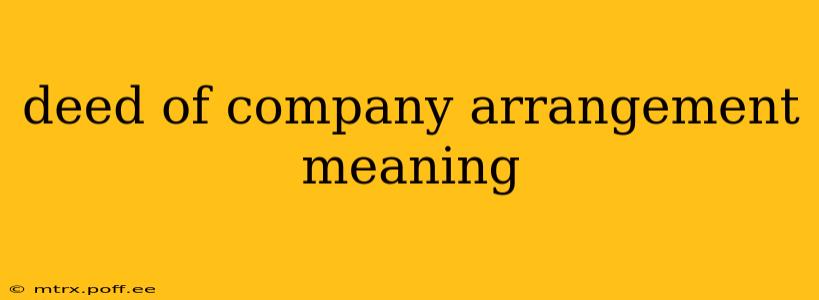A Deed of Company Arrangement (DOCA) is a legally binding agreement that allows financially distressed companies in Australia to restructure their debts and operations, avoiding liquidation. It offers a lifeline to businesses facing insolvency, providing a structured framework to negotiate with creditors and ultimately, hopefully, restore financial stability. This guide will delve into the meaning and intricacies of a DOCA, answering common questions and providing a clear understanding of this crucial insolvency tool.
What is a Deed of Company Arrangement (DOCA)?
A DOCA is a formal agreement between a company and its creditors, overseen by an administrator or liquidator. It outlines a plan for the company to repay its debts, often over an extended period, potentially involving compromises on the amounts owed. The plan might include selling assets, restructuring operations, or a combination of both. The goal is to allow the company to continue operating and eventually become solvent again. It’s a crucial alternative to liquidation, preserving jobs and potentially saving the business.
How Does a DOCA Work?
The process begins when a company is placed into voluntary administration. During this period, the administrator investigates the company's financial position and explores options for rescuing it. If a DOCA is deemed feasible, the administrator proposes a plan to creditors. This plan details how the company intends to address its debts. Creditors then vote on the proposal. If a majority of creditors, representing a majority of the debt, approve the plan, the DOCA is implemented. The company then operates under the terms of the DOCA, which is legally binding on all participating parties.
Who is Involved in a DOCA?
Several key players are involved in a DOCA process:
- The Company: The struggling business seeking to restructure its debts.
- Creditors: Individuals or businesses owed money by the company.
- Administrator/Liquidator: An independent professional appointed to oversee the process and ensure fairness.
- Stakeholders: Employees, directors, and other parties with an interest in the company's outcome.
What are the Advantages of a DOCA?
A DOCA offers several potential advantages:
- Avoids Liquidation: It prevents the immediate closure of the business, saving jobs and potentially preserving value for stakeholders.
- Debt Restructuring: Allows for a negotiated repayment plan, potentially reducing the overall debt burden.
- Continued Operation: The company can continue trading while implementing the restructuring plan.
- Protection from Creditors: Provides a legal shield against further creditor action during the DOCA period.
What are the Disadvantages of a DOCA?
While a DOCA offers several benefits, potential drawbacks include:
- Complexity and Cost: The process can be complex and expensive, requiring professional fees.
- Time-Consuming: Restructuring can take significant time, demanding patience from all parties.
- Uncertain Outcome: There's no guarantee that the DOCA will succeed, and the business might still fail.
- Loss of Control: The company may lose some control over its operations during the administration period.
What Happens if a DOCA Fails?
If the DOCA fails to achieve its objectives or isn't approved by creditors, the company may proceed to liquidation, potentially resulting in its closure and the sale of its assets to repay creditors. This outcome is often less desirable than a successful DOCA.
How is a DOCA Different from Liquidation?
The primary difference is that a DOCA aims to rescue the company and allow it to continue trading, whereas liquidation involves the winding up of the business and the sale of its assets to pay off debts. A DOCA provides a more flexible and potentially less damaging outcome for all parties involved, but requires the agreement and cooperation of a majority of creditors.
What are the Key Steps in Establishing a DOCA?
Establishing a DOCA is a multi-step process, beginning with the appointment of an administrator and culminating in the approval and implementation of the agreement. It's essential to seek professional advice from insolvency practitioners throughout this process.
Can a DOCA be Used for Every Type of Business?
While a DOCA is a viable option for many businesses facing financial distress, its suitability will depend on various factors, including the company's financial situation, the nature of its debts, and the willingness of creditors to cooperate. Professional advice is crucial in determining the feasibility of a DOCA for a specific business.
This comprehensive guide provides a clear understanding of the Deed of Company Arrangement (DOCA) in Australia. Remember to consult with legal and financial professionals for tailored advice regarding your specific circumstances. This information is for general understanding only and does not constitute legal or financial advice.
